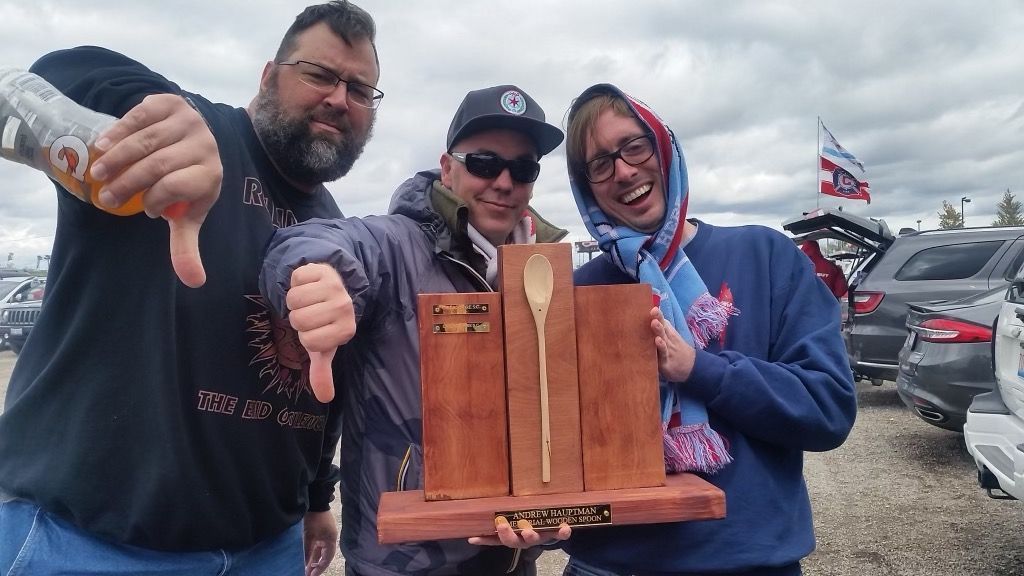Lionel Messi and his Inter Miami teammates have already secured MLS‘ Supporters’ Shield, and they’re currently the heavy MLS Cup favorites in the playoffs, but even the demigod of soccer himself will miss out on one trophy this season: The Wooden Spoon.
Conceptualized, created and maintained by die-hard fans, the trophy is managed by the Independent Supporters Council (ISC), a collective of groups from the U.S. and Canada that hand the annual award to the supporters of the team with the worst finish in MLS.
Some fans hate it. Others embrace it and flip the narrative, because after all, a title is a title and the two-foot piece of lumber is a handy symbol of accountability in a league without relegation. At the league level, a representative from MLS confirmed to ESPN that they have no role in the trophy, thereby making it an unofficial one.
A bittersweet icon with layers of meaning behind it, here’s the story of the Wooden Spoon trophy.
‘Why did you make this?’
Imagine being a supporter of the Chicago Fire in 2017. You’re trying to move on from your team’s back-to-back last place finishes from the previous two years, and as you’re sipping a beer at a tailgate and basking in the aspirations of a new season, you see someone carrying a visually imposing wooden structure towards you.
As a strange homemade trophy comes into light, you see two golden plaques on it commemorating the recent disastrous seasons that you’re trying to forget, and a cracked wooden spoon centered in the middle.
The Wooden Spoon trophy is a fan-led effort to keep MLS teams accountable for poor seasons and express supporter dissatisfaction in a league with no relegation. Daniel Giroux
Daniel Giroux, the creator of the Wooden Spoon trophy, remembers some comments made by fellow Chicago Fire fans — Why did you make this? You’re bringing shame to our team. — when they first laid eyes upon it.
“This was meant to look cheap…[it] looks the part of being the bottom place trophy,” Giroux, who now works for the University of Nevada’s department of art, art history and design, said. “I wanted to keep it as simple as possible, while also being so big and obtrusive you couldn’t not see it.”
So why make such a thing? It stems back to a 2016 decision from the ISC, who also oversee the Supporters’ Shield trophy that Messi clinched this season.
“It [the Wooden Spoon] was created as a way to bring attention to issues to hopefully have another accountability piece for our clubs. We don’t have relegation in MLS, so how can we make clubs care if they are settling for the minimum,” said Bailey Brown, current president of the ISC that took part in the group’s 2016 conference.
Due to the Chicago Fire’s position in last, the team’s supporters agreed to make the trophy, one that was intended to convey the frustrations of the Fire’s failures. Giroux, then working at the School of the Art Institute of Chicago, was the perfect choice given his role as the go-to craftsman for Section 8, an association of supporters’ groups for the Chicago Fire.
“It is made of 90% plywood, wood glue, malort [a famous Chicago-based liquor] and hatred,” once said Giroux to Switch The Pitch.
Editor’s Picks
2 Related
“I probably went through about five wooden spoons before I got the one on there to actually work. They kept shattering,” said Giroux with a laugh. “[I] experimented which way is actually going to work for nailing it onto the damn thing because they’re so cheap, they just shatter at the core. That one’s probably like spoon number six that you actually see.”
A poignant final touch was placed at the base of the trophy. In order to properly highlight the mismanagement of the Chicago Fire, an additional plaque selected the trophy name as the “Andrew Hauptman Memorial Spoon,” thereby shaming the now-former owner of the club. Despite the trophy being intended as a representation of fan dissatisfaction, it became a celebrity of sorts, often showing up at tailgates.
“It was kind of celebratory,” said Nicole Hack, a former chair of Section 8 who is now co-vice president of the ISC. “We took something that was really unfortunate and really sad with what was happening with our team and we kind of embraced what was going on.”
Just as importantly, supporters would also occasionally bring it to club events, where they knew Chicago Fire staff would be present.
“We definitely made a point to try to bring it to as many of those as possible,” said Giroux. “It’s lighthearted, but it’s also kind of meant as a shaming thing and an empowering thing, right? Like, hey, we’re taking this seriously.”
The mysticism of the Spoon
As opposed to the pomp and circumstance of Messi lifting the Supporters’ Shield with tens of thousands in attendance in Miami last Saturday, the passing of the Wooden Spoon is often in the main hall of a hotel or conference center during the ISC’s annual meeting in January. In front of the entire Council and with a microphone in hand, the group giving it away typically gives a quick address and then hands it to receiving supporters.
“There is normally a humorous vibe in the acceptance of it,” said Bailey. “People give speeches if they want, but it’s quite often one of those moments where the season had been so bad that people laugh and say, ‘At least we won something.'”
Locations can vary though, such as when the Vancouver Whitecaps‘ supporters hosted the conference and brought everyone to BC Place stadium for the annual meeting.
“[They] gave us a full tour of the stadium and let us walk on the pitch for a bit,” reminisced Giroux.
The passing of the Wooden Spoon trophy from one fan group to the next typically takes place in January of each year, at a conference organized by the Independent Supporters Council. Daniel Giroux
With the Chicago Fire fanbase, there was a sense of ownership and care for the trophy they created, but what happens when it’s sent to another group who have no connection to it?
“On one of the podcasts at one time, I’m like, listen, if the [LA] Galaxy end up winning this Wooden Spoon, then you know what, give it to me and I’ll put it on the podcast and it’ll be on the podcast every single week,” said Josh Guesman, host of the Corner of the Galaxy, to ESPN. “Members of the supporters groups heard that. I didn’t plan on them hearing it,” said Guesman.
With a spot in last in 2017 for the LA Galaxy, the supporters decided that Guesman’s show would be a perfect home for the trophy, which was then renamed as the “Anthony Precourt Memorial Wooden Spoon” in order to shame the former Columbus Crew owner who had been trying to relocate the team.
Every day as he walked into his office, and during the background of each episode of his podcast in 2018, Guesman shared a space with the trophy. “This is the failure of the organization and the organization would like nothing better than [for it] to go away.” Some supporters wanted nothing to do with it either.
While covering a reserve game for the LA Galaxy in 2018, Guesman remembers a fan aggressively approaching him — You need to get that Wooden Spoon off the podcast. — about the trophy.
STREAM ESPN FC DAILY ON ESPN+
Dan Thomas is joined by Craig Burley, Shaka Hislop and others to bring you the latest highlights and debate the biggest storylines. Stream on ESPN+ (U.S. only).
Guesman disagreed. He noted to the fan that the trophy was a reminder of the team’s missteps, and that if things didn’t change, setbacks would continue going forward with LA Galaxy.
“The guy literally got angry…I thought maybe I might have to fight,” said Guesman with a laugh. “I get the reaction, it’s not that I don’t get the reaction. I think it’s a little extreme but he was really upset that it was on every single podcast,” said the host. “I think that’s what the Wooden Spoon is, it’s a reminder not to be bad at what you do.”
When Guesman brought the trophy back to LA Galaxy supporters at the end of the 2018 season, there were visceral responses ranging from individuals who didn’t want to touch it, others who lifted middle fingers, some who took photos, and also those who were astounded to be in the presence of it.
“People were like, ‘oh my God, that’s it, that’s the Wooden Spoon.’ “
When FC Cincinnati finished dead last from 2019-2021, supporters learned to appreciate the Wooden Spoon with each passing season.
“Obviously we are disappointed with the results on the field, but I think the fan base has embraced having the Spoon for the third time, second officially,” said Jared Handra, president of FC Cincinnati supporter group Die Innenstadt, to the ISC’s website in 2021. “People just have fun with it now, it’s pretty cool to win a trophy three years in a row.
“We wanted to win trophies; I guess it’s on us for not specifying which one.”
play
2:00
Moreno: Inter Miami are in a different league with Lionel Messi
Alejandro Moreno reacts to Inter Miami’s record-breaking regular season in MLS with Lionel Messi.
‘The trophy should be shared’
Due to the complicated feelings of the object itself, or simply not wanting to acknowledge it, the Wooden Spoon can also go into hiding.
When the San Jose Earthquakes were given the trophy in 2019 (due to their 2018 last place finish), the Wooden Spoon was nowhere to be seen by fans that season. According to Crystal Cuadra-Cutler, president of The Faultline supporter group, the leader of a separate and now defunct group “just held on to the trophy and updated the plaques on it” without bringing it out in public.
For die-hard supporters that commit an endless amount of time to their clubs — and in a country in which MLS is often glanced over — it may not be easy to take things on the chin.
“We were not aware of the trophy, until someone from the ISC reached out about DC [United] trying to get the trophy sent to us,” said Peter Pakatchian, president of Toronto FC supporter group Red Patch Boys, to ESPN.
Pakatchian and the Red Patch Boys offered it to Toronto FC as a source of inspiration earlier this season, but were turned down. At the moment, the trophy is currently sitting in a storage locker until it’s passed onto the next group for 2025.
“The group and many other groups did not want to do anything with it,” said Pakatchian.
In 2024, no team had a more difficult time than the San Jose Earthquakes, who finished with a paltry total of 21 points. In comparison, Messi’s Miami finished with 74 in the regular season. Phillip Leyva, who covers the San Jose Earthquakes as a member of Quakes Epicenter, remembered a moment back in the summer that foreshadowed problems.
“This was early, like this was June 22, this was early in the season, [forward] Benji [Kikanovic] came into the news conference and he said ‘We’re s—.’ That’s the word that he used,” said Leyva to ESPN. “‘We’re not playing good enough, this is s—.’ I just remember he kept repeating that.”
According to Leyva, issues like injuries and the team’s mentality held the squad back. He also noted “a dearth of MLS level quality in the defensive part of the pitch, across the back line and especially at the goalkeeper position — they’re just leaking in goals.” Looking at the investment of the team, which has the four-lowest total guaranteed compensation in MLS, Leyva doesn’t expect things to get significantly better in the future.
STREAM FUTBOL AMERICAS ON ESPN+
Herculez Gomez and Sebastian Salazar debate the biggest storylines and break down the best highlights that soccer in the Americas has to offer. Stream on ESPN+ (U.S. only)
“A lot of that comes down to the ownership, I think that’s the one important thing that you should probably mention,” said Leyva. “If you haven’t already thought about it, the extent to which John Fisher affects this organization.”
One month before the San Jose Earthquakes officially closed out the regular season in last place, Fisher’s other team, MLB’s Oakland A’s, played their very last in the Bay Area just up the highway. Furious with Fisher’s plan to move the team to Las Vegas, baseball fans belted chants of “sell the team” with the knowledge that their owner would soon steal a part of their sporting hearts.
Sports fandom can sometimes feel futile and hopeless in the face of these situations. Yet supporters do have the power of expression to help push for change or improvements to be made.
“If supporters want to put pressure on their front office to do better, then this is a reminder,” said Hack about the Wooden Spoon. “We also have to be the voices to put pressure on our organizations.”
Giroux agrees. “It was kind of intended as a satirical object,” he said. “This idea of building something to criticize and make light of something serious that’s actually happening.”
So what’s next for the Wooden Spoon?
“I think that the trophy should be shared. The trophy is usually presented at the annual ISC conference in January and I will be bringing it back to San Jose. My group already plans to have the trophy at a few events next preseason,” the Faultline’s Cuadra-Cutler said.
“We plan to just embrace and own it.”







